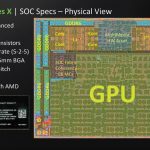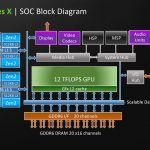The Xbox Series X SoC has been detailed during Microsoft's presentation at Hot Chips 2020. Besides revealing the SoC die, Microsoft also shared new information about the Xbox Series X, including graphical features and optimisations, storage specifications, encode/decode support and more.
The die-shot of the SoC shows us that the AMD APU powering the Xbox Series X will feature Zen 2 and RDNA 2 cores based on TSMC’s 7nm “enhanced” process node, featuring a core clock of 3.8GHz without SMT, reducing to 3.6GHz with SMT on. As per the slides, this SoC seems similar to the Renoir APUs, with 4MB of L2 cache and 8MB of L3 cache. This means that the CPU part of this APU will be lacking the Ryzen 3000 desktop processor's GameCache, which gives 32MB of L3 cache to the Ryzen 7 3800X.
The GPU part of the SoC will be based on RDNA 2 architecture and feature 26 Dual-sided CUs (52 CUs) with their own L0 cache and GDDR6 memory. There will be 5MBs of shared L3 cache across the four arrays of DCUs, with each array consisting of 7 DCUs sharing an undisclosed amount of L1 cache.
Other optimisations that will come with Xbox Series X include mesh shaders, which allow the GPU to render more objects with less computing power, texture sampler feedback, used to free up VRAM from unused textures, and variable rate shading, which enables allocation of computing power depending on how “visually important” a certain area of the screen is.
Hardware accelerated ray-tracing will also be supported on the Xbox Series X. The console will be able to do up to 380G/sec ray-box calculations and up to 95G/sec ray-triangle calculations. Something similar to DLSS might also be introduced, as the slides state that there will be “ML inference acceleration for games (character behaviour, resolution scaling)”.
The Xbox Series X will support HDMI 2.1, capable of displaying 4K content at 120Hz or 8K content at 60Hz. The video encoder/decoder will support AVC and HEVC HDR encode and 480p/1080p, 4K/8K AVC, and HEVC/VP9 HDR decode. For storing your games, there will be a 1TB PCIe Gen4 NVMe SSD, but you can add an extra one for more storage.
KitGuru says: Did you expect Xbox Series X would be this powerful? Are you hoping to get your hands on a next-gen Xbox console?
 KitGuru KitGuru.net – Tech News | Hardware News | Hardware Reviews | IOS | Mobile | Gaming | Graphics Cards
KitGuru KitGuru.net – Tech News | Hardware News | Hardware Reviews | IOS | Mobile | Gaming | Graphics Cards





